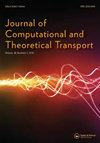质子治疗中快速反应变化计算的一种基于确定性伴随的半解析算法
IF 1.1
4区 工程技术
Q3 MATHEMATICS, APPLIED
Journal of Computational and Theoretical Transport
Pub Date : 2022-08-25
DOI:10.1080/23324309.2023.2166077
引用次数: 0
摘要
摘要在本文中,我们提出了一种解决方案,以满足在线自适应质子治疗中快速粒子传输算法的需求,该算法能够廉价但准确地计算由于系统参数变化而导致的患者剂量指标的变化。我们通过一维Fokker-Planck方程的数值解和Fermi-Eyges方程的解析解的乘积获得质子相空间密度。此外,还导出了相应的伴随系统,并对伴随通量进行了求解。质子相空间密度以及伴随通量和度量(选择为光束在感兴趣的可变区域中沉积的能量)允许评估我们的算法对系统参数和感兴趣区域中的不同扰动范围的准确性。对于小的Hounsfield单位(HU)扰动范围(-40 HU至40 HU),该算法实现了可忽略的误差(),对于大的扰动范围(-400 HU至400 HU)(符合伴随方法的众所周知的限制),在大多数临床感兴趣的情况下,感兴趣的区域围绕Bragg峰,该算法获得了小到中等的误差(3%至17%)。考虑到这些结果,再加上进一步提高计时性能的能力,可以得出结论,我们的算法为在线自适应质子治疗的特定目的提供了一个可行的解决方案。本文章由计算机程序翻译,如有差异,请以英文原文为准。
A Deterministic Adjoint-Based Semi-Analytical Algorithm for Fast Response Change Computations in Proton Therapy
Abstract In this paper we propose a solution to the need for a fast particle transport algorithm in Online Adaptive Proton Therapy capable of cheaply, but accurately computing the changes in patient dose metrics as a result of changes in the system parameters. We obtain the proton phase-space density through the product of the numerical solution to the one-dimensional Fokker-Planck equation and the analytical solution to the Fermi-Eyges equation. Moreover, a corresponding adjoint system was derived and solved for the adjoint flux. The proton phase-space density together with the adjoint flux and the metric (chosen as the energy deposited by the beam in a variable region of interest) allowed assessing the accuracy of our algorithm to different perturbation ranges in the system parameters and regions of interest. The algorithm achieved negligible errors ( ) for small Hounsfield unit (HU) perturbation ranges (–40 HU to 40 HU) and small to moderate errors (3% to 17%) – in line with the well-known limitation of adjoint approaches – for large perturbation ranges (–400 HU to 400 HU) in the case of most clinical interest where the region of interest surrounds the Bragg peak. Given these results coupled with the capability of further improving the timing performance it can be concluded that our algorithm presents a viable solution for the specific purpose of Online Adaptive Proton Therapy.
求助全文
通过发布文献求助,成功后即可免费获取论文全文。
去求助
来源期刊

Journal of Computational and Theoretical Transport
Mathematics-Mathematical Physics
CiteScore
1.30
自引率
0.00%
发文量
15
期刊介绍:
Emphasizing computational methods and theoretical studies, this unique journal invites articles on neutral-particle transport, kinetic theory, radiative transfer, charged-particle transport, and macroscopic transport phenomena. In addition, the journal encourages articles on uncertainty quantification related to these fields. Offering a range of information and research methodologies unavailable elsewhere, Journal of Computational and Theoretical Transport brings together closely related mathematical concepts and techniques to encourage a productive, interdisciplinary exchange of ideas.
 求助内容:
求助内容: 应助结果提醒方式:
应助结果提醒方式:


